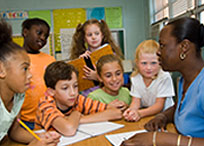
GRADE 1: ENGLISH LANGUAGE ARTS
What my child is learning
In Grade 1, your child learns about listening, speaking, reading, writing, viewing, and representing.
Your child learns to understand and communicate about what he or she hears and sees, for example in books, videos, songs and nursery rhymes. Your child learns to:
- talk and think about his or her own experiences
- react to ideas and others’ feelings
- figure out the meaning of words and think about ideas
- talk about or show personal connections
- talk and ask questions about a topic and find answers in different ways (such as from his or her own experiences, books, and videos)
Your child learns to communicate and share ideas with others in different ways, such as:
- drawing, telling stories, writing down ideas, using photographs, singing and role-playing
- comparing, categorizing, selecting, and explaining information and ideas
- matching letters and sounds and writing some familiar words
In Grade 1, your child also learns to take turns, co-operate, help others, and ask others for help.
To find out more about what your child is learning, talk to the teacher. You may also refer to the Language Arts Practices: Orientation guide for information regarding the program's guiding principles and recommended practices.
How your child is assessed
Your child’s progress in English Language Arts will be reported in three areas:
Comprehension (Reading, Listening and Viewing)
- What does your child do to think about and understand stories, information, and pictures?
- How does your child use actions, drawings and words to communicate about ideas, art, stories, or information?
- How well does your child follow or recall steps to do something?
- How does your child listen to and share ideas and feelings?
Communication (Writing, Speaking and Representing)
- How does your child communicate ideas, information, and feelings?
- How does your child participate in activities to share questions, ideas, information, and words about a particular theme or topic?
- How does your child express and organize ideas in writing and pictures?
Critical Thinking
- How does your child compare stories, events and information to his or her own experiences or knowledge?
- How does your child make predictions and use information and experiences to check the predictions?
- Does your child choose information and ideas that help explore or answer his or her questions?
The teacher will report on your child’s progress in these areas three times a year.
The information from each report helps you to support your child’s learning. You can use it to talk with your child and your child’s teacher about results, strengths, challenges and what your child will be doing next.
Resources
- Winnipeg Public Library: Features information and programming devoted to Early Literacy as well as access to several databases of digital storybooks for a variety of grade levels.
- Lalilo: Learners following this program develop their phonological awareness skills while gradually learning the fundamentals of reading. Families may opt to have their children study in French or in English upon opening a free parent account.
- Reading Bear: A free online program that teaches beginning readers vocabulary and concepts while systematically introducing all the main phonetic patterns of written English.
- CBC has developed a number of educational apps for building children’s vocabulary and introducing them to the joys of reading. The PBSKids website includes a number of Reading Games, while Storyline Online features videos of award-winning actors reading picture books suitable for young children.
- Online Resources for Manitoba Educators: Notified homeschooling families may access this online collection of eBooks, Audio books, eJournals and other resources.
- Please visit the My Learning at Home – English website for links to more English language resources.


